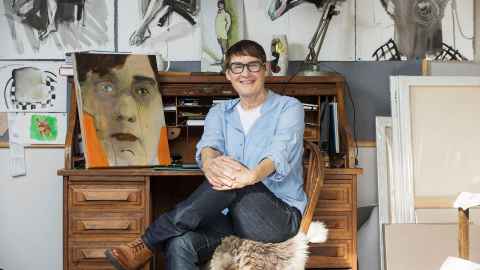A taste for adventure
1 July 2024
From returning to university aged 33 to being detained in Ethiopia, JR Rowland has experienced risk and reward in her academic career.

As a child, Professor Julie Rowland devoured her brother’s educational World of Wonder magazines and pored over her father’s copy of High Adventure, Sir Edmund Hillary’s account of climbing Mt Everest.
She was fascinated by stories of epic adventure.
When hockey goalkeeper Trevor Manning played on with a shattered kneecap for New Zealand to win gold at the 1976 Olympic Games in Montreal, Julie was inspired. His story had it all – risk, bravery, triumph – and she needed to play for New Zealand, too.
She achieved that ambition in the 1980s, becoming vice-captain of New Zealand’s under-21 women’s hockey team and then a member of the national women’s team.
As ‘JR’ tells it (the name bestowed by hockey teammates has stuck), academic life as a geologist and a leader has been similarly loaded with adventure.
‘Yes, do load that gun: tales of high adventure in academia’, was the title of her inaugural lecture as a professor in May.
The deputy dean of the Faculty of Science told friends, family, colleagues, mentors, students and professional staff of an unconventional academic career and diverse enthusiasms, from training her dog to herd sheep to figure painting (she’s no slouch as an artist).
JR grew up in Whanganui, and her parents steered her toward studying science at school. A holiday snap from 1974 shows an early field expedition – a Rowland family visit to the Waimangu geothermal field in the central North Island.
She learned the craft of educator during a decade teaching at Tangaroa College in Ōtara, James Cook High School in Manurewa, St Cuthbert’s College in Epsom (a challenging time for a Rainbow individual during the late 1980s), and Western Springs College. She taught maths and science and became the head of physical education at Western Springs.
She loved it all – but eventually needed a change.
Returning to the University of Auckland at age 33 to complete a science degree – “It was so scary. Did I have the smarts?” – she retrained to become a geologist, later getting her PhD at the University of Otago and becoming a lecturer.
It’s all been unusual, exciting and daring to me.
Powerful forces reshaping Earth’s landscapes over millions of years, such as colliding tectonic plates, magma, and water breaking down rock, became JR’s research specialty.
Nearly 40 years after that family trip to Waimangu, the area would feature in a prizewinning scientific paper by JR and her mentor Stuart Simmons.
The Antarctic, Chile, the Caribbean, and the Afar region in Ethiopia, where the African continent is splitting apart and a new African ocean will form, have been locations for her on the-ground research.
Mostly flat desert, Afar is known for extreme heat, volcanic activity and bandits. A veteran of arbitrary detention in Afar, JR was travelling with fellow researchers and an armed guard in 2009 when she told him to ignore the usual protocol of keeping the magazine out of the rifle – hence the title of her talk.
She regrets the “scientific imperialism” of UK-led research in Ethiopia, which failed to engage with the local peoples, adding, “my time teaching in South Auckland and my experience in Afar usefully rubbed off any lingering imperialistic tendencies”.
JR makes no apologies for being an economic geologist, carrying out research connected with mineral exploration and extraction. Industrial civilisation requires minerals; the twist now is ensuring they’re exploited in the least damaging ways.
A key focus as deputy dean of the Faculty of Science is implementing Taumata Teitei, the University’s vision and strategic plan.
Driving the establishment of Ngā Ara Whetū (which translates as ‘star paths’), the research centre focused on climate change and biodiversity, and heading the School of Environment have been among her leadership roles.
She credits a leadership mindset course at the Business School for honing her skills in that area.
Has academia truly been an adventure? “Crikey, yes,” she says.
“Avoiding bandits, engaging the minds of undergraduates, leading teams of unbelievably clever people – it’s all been unusual, exciting and daring to me, and that’s the definition of adventure.”
Paul Panckhurst
This story first appeared in the July 2024 issue of UniNews.